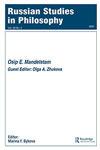Stavrogin and His Soul, or: The Transformation of Skepticism in the Digital Age
IF 0.1
4区 哲学
Q4 Arts and Humanities
引用次数: 0
Abstract
ABSTRACT It is not by chance that the title of this article paraphrases Gustav Gustavovich Shpet’s article “The Skeptic and His Soul” (1919). Is Stavrogin a skeptic? Yes, and the novel Demons is a narrative about how self-satisfied, self-flattering skepticism (skepticism for its own sake) leads man to devastation, to the dead end of absolute nihilism, to spiritual and literal suicide. Two circumstances lead us to this interpretation both of Dostoevsky’s novel and of its central character, Nikolai Stavrogin: the striking, contemporary “recognizability” of the story, even at the narrative level (at least for contemporary Russia), and our familiarity with materials from Shpet’s archives dedicated to Dostoevsky’s work. Handwritten notes, a synopsis of Demons, and a wealth of correspondence show how Shpet (with other Russian thinkers of his time) was immersed in the theme of transformation of skepticism against the background of Russia’s revolutionary upheavals. This immersion distinctly clarifies for us today the origins of the relevance of Demons, a novel recounting how skepticism tumbles into the void of nihilism. The article demonstrates how completely modern digital forms of self-expression and forms of “conversation” unfolding online are surprisingly commensurate with the form of social structure Dostoevsky presents in Demons. The form of conversation he found to express skeptical doubt turning into nihilism has become a reality today, vividly represented in social media, where conversation is transformed into “chat rooms.”斯塔夫罗金和他的灵魂:数字时代怀疑主义的转变
本文的标题改写了古斯塔夫·古斯塔沃维奇·谢佩特的文章《怀疑论者和他的灵魂》(1919),这并非偶然。斯塔夫罗金是个怀疑论者吗?是的,小说《恶魔》是一个关于自我满足、自我奉承的怀疑主义(为了自己的利益而怀疑主义)如何把人引向毁灭,走向绝对虚无主义的死胡同,走向精神上和文字上的自杀的叙述。有两种情况使我们对陀思妥耶夫斯基的小说及其中心人物尼古拉·斯塔夫罗金(Nikolai Stavrogin)有了这样的解读:故事引人注目的当代“可识别性”,甚至在叙事层面上(至少对当代俄罗斯来说),以及我们对谢佩特(Shpet)档案馆中专门研究陀思妥耶夫斯基作品的材料的熟悉。手写的笔记、《恶魔》的摘要和大量的通信表明,谢佩特(与同时代的其他俄罗斯思想家)是如何沉浸在俄罗斯革命动荡背景下怀疑论转变的主题中。这种沉浸为我们今天清楚地阐明了《恶魔》相关性的起源,这部小说讲述了怀疑主义是如何陷入虚无主义的虚空的。这篇文章展示了自我表达的完全现代数字形式和在线展开的“对话”形式是如何与陀思妥耶夫斯基在《恶魔》中呈现的社会结构形式惊人地相称。他发现的表达怀疑的对话形式变成了虚无主义,今天已经成为现实,在社交媒体上生动地表现出来,在社交媒体上,对话变成了“聊天室”。
本文章由计算机程序翻译,如有差异,请以英文原文为准。
求助全文
约1分钟内获得全文
求助全文
来源期刊

RUSSIAN STUDIES IN PHILOSOPHY
PHILOSOPHY-
CiteScore
0.10
自引率
0.00%
发文量
14
期刊介绍:
Russian Studies in Philosophy publishes thematic issues featuring selected scholarly papers from conferences and joint research projects as well as from the leading Russian-language journals in philosophy. Thematic coverage ranges over significant theoretical topics as well as topics in the history of philosophy, both European and Russian, including issues focused on institutions, schools, and figures such as Bakhtin, Fedorov, Leontev, Losev, Rozanov, Solovev, and Zinovev.
 求助内容:
求助内容: 应助结果提醒方式:
应助结果提醒方式:


